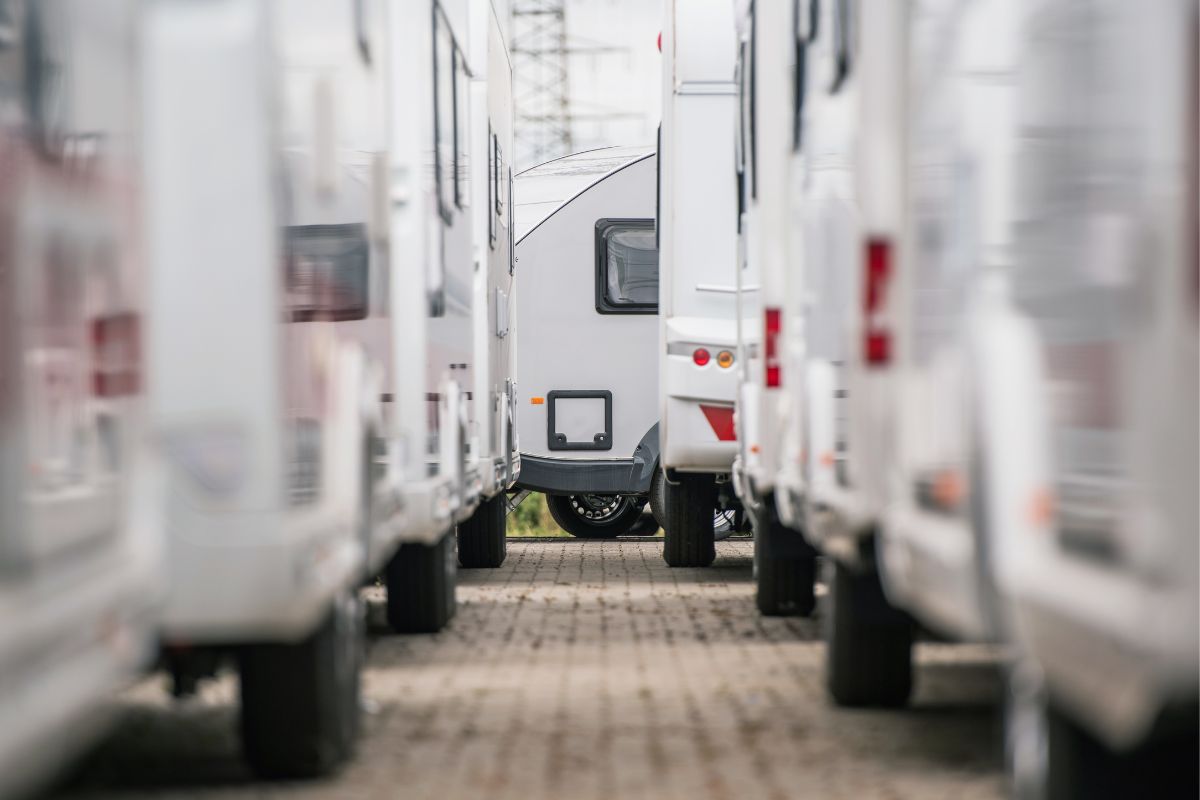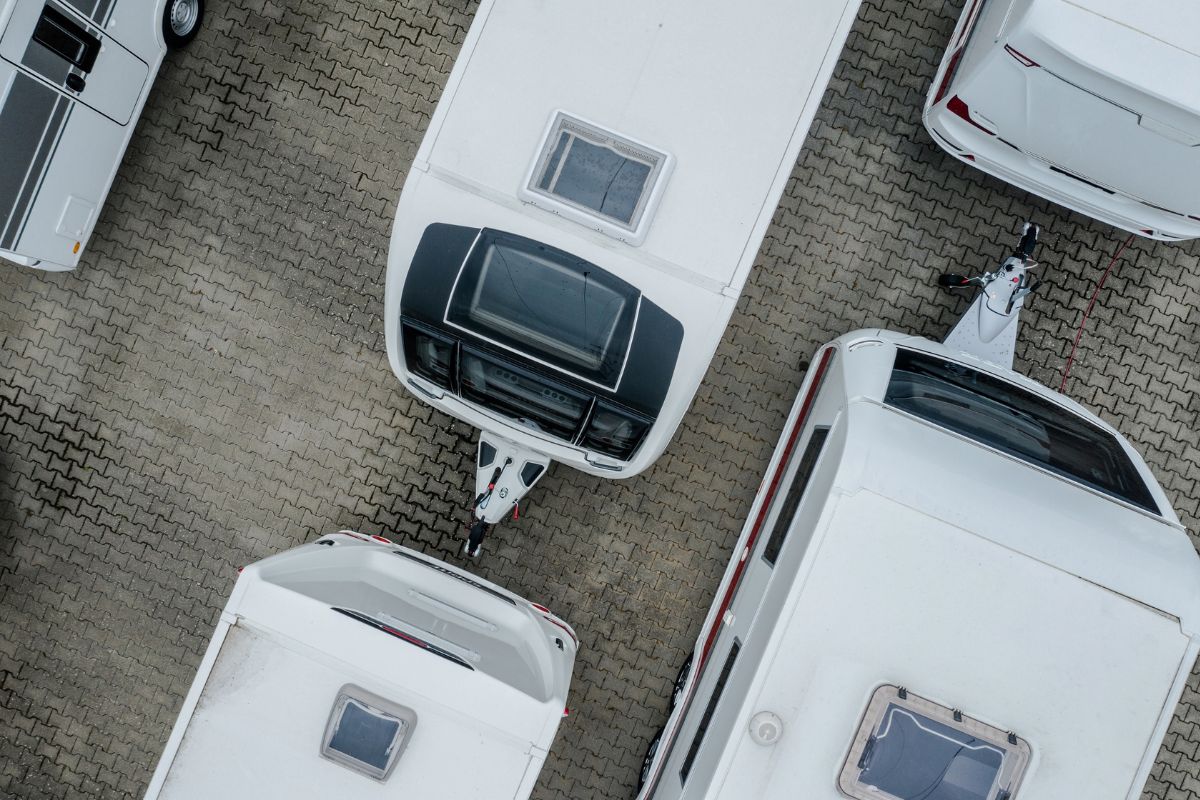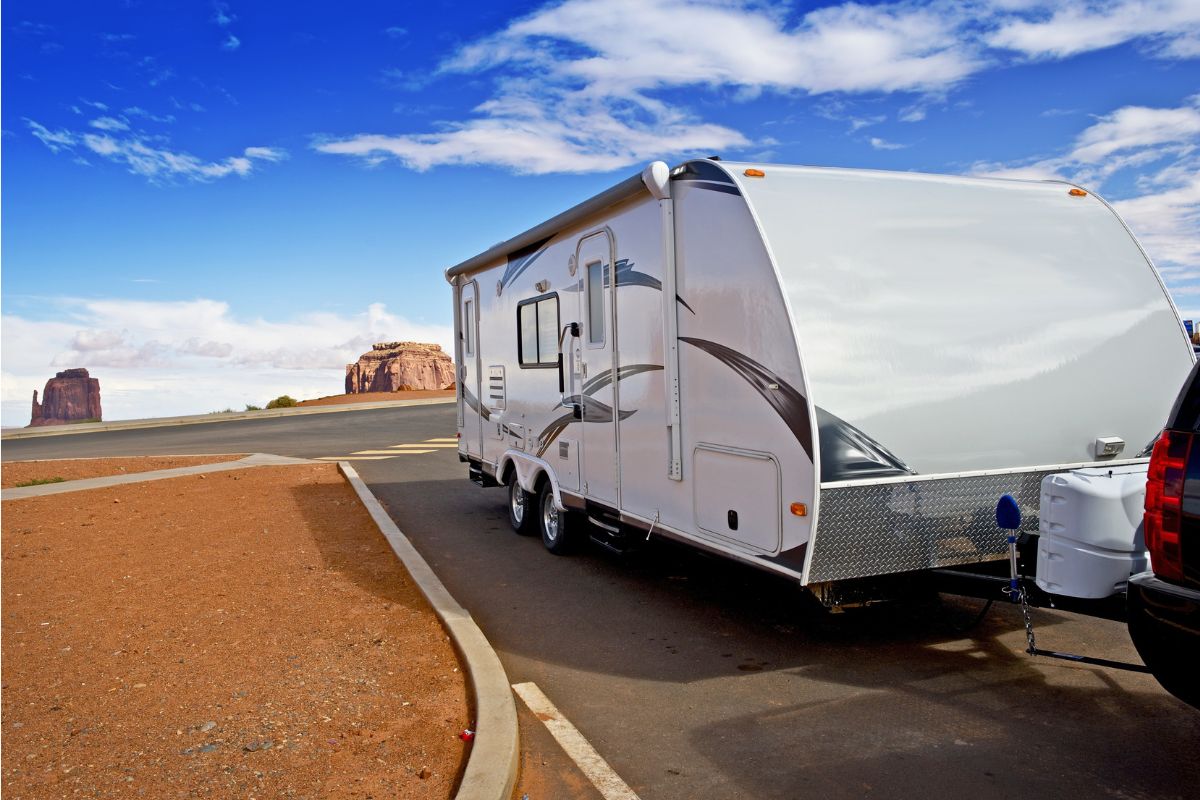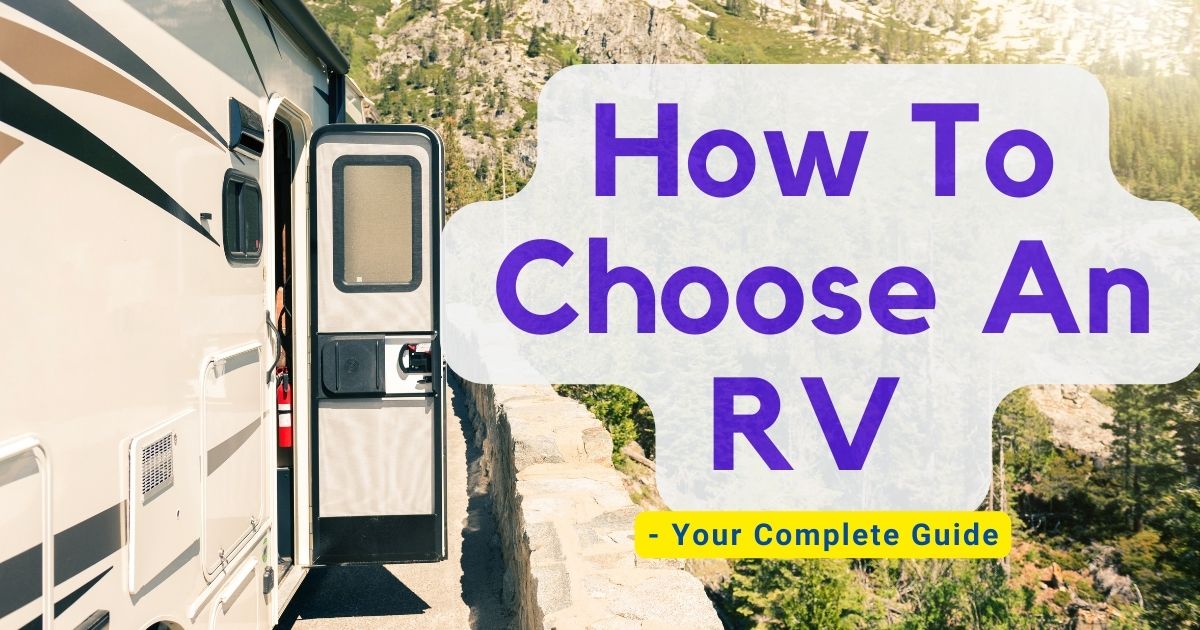Buying a Camping Trailer
RVs are essential for anyone who loves going on vacations. It is, therefore, important to know how to choose an RV that will meet all your camping needs.
RVs, also known as motor homes or recreational vehicles, allow you to travel in a self-contained bubble with all the amenities of a home, including space for your pets. They are even a practical choice for individuals who support the “work from anywhere” concept.

How to Choose an RV
It’s critical to make the right choice. Ensure that you buy something with confidence and knowledge and do it correctly the first time! The following is a list of crucial factors to consider when purchasing a motorized RV.
Safety
As a first-time RV buyer, you should avoid any RV that doesn’t include maintenance documents. You should have documentation for purchasing this size. Make sure the used equipment has maintenance records. Knowing the RV has sufficient maintenance throughout its lifespan is crucial.
Check everything, even the stitching on the upholstery and fans, even in a brand-new vehicle.
These inspections are equally crucial when purchasing a camper. Ask the dealer to check the functionality of each system.
This includes any conveniences that come as standard with your potential rig, such as propane, an air conditioner, slide mechanisms, an engine (if applicable), and so on. Stop the process right away if these systems aren’t functioning. If you even have the remotest idea that the RV isn’t ready for the road, don’t buy it!
Comfort
You should purchase an RV that is comfortable for you and your children. Full-time RVers will be the first to confess that most RVs aren’t as plush or cozy as the homes you leave behind. For full-timers, that represents a reasonable exchange for the freedom and excitement that living in an RV affords.
However, you shouldn’t accept an uncomfortable RV! Find a setup that feels comfortable to you. On lengthy journeys, you shouldn’t feel constrained or claustrophobic. Are you an avid cook? Make sure you like the kitchen design. Do you require solitude? Search for an RV with doors and partitions. The windscreen makes the Class As popular.
They claim that it offers fantastic views and a more open feeling when driving. For some people, fifth-wheels or travel trailers are the closest to “a conventional house” they can get. Class C is the best because it is very pleasant to travel in the driver’s seat, and the overhead bunk can offer your child space. Visit a showroom to get a sense of the many RV categories.
Storage
Be honest about how much storage space you’ll require, and give it a top priority while looking for an RV. You may have the impression that you would have to downsize significantly when you move from your apartment to your first RV. That might not be the case with the storage your fifth wheel will supply.
When buying a new RV, always take storage space into account! Consider your camping companions’ clothes, shoes, and other essential items. Where will you keep your camping supplies and RV equipment? What food storage options?
Floor Plan
Choosing the ideal RV floor plan might take a lot of time. In any case, there are thousands upon thousands of them! Choosing just a one-floor plan with so many available can be daunting.
Choose a layout that gives each camper its bed, unless you often travel with eight people, in which case, good luck locating a truck big enough for eight individual beds!
Whether you plan to travel in your RV on weekends or live in it full-time, your choice will impact how well or poorly your experience turns out. If you want to bring pets, remember that they will also require a place to rest.
Make a “must-have” RV guide and follow it. A variety of floor plans offer various amenities.
Are washers and dryers necessary? How many televisions do you want? Are bunk beds critical or fold-out couches? How many bathrooms? Would you prefer a bedroom door that you can close?
A single RV model typically has a wide range of floor plans. Visit a dealership and review each floor plan to get the best sense of the various ones.
Camping Style
Your decision will depend on the kind of camping you intend to perform. Consider the type of camping you would enjoy. You might need a smaller rig to camp in state and national parks.
Most dedicated RV parks will accept a larger RV if you choose a full hookup site.
Budget
Regarding your spending, be sincere. You may adore how a fifth wheel feels, but you also need to consider whether you can afford the required truck to tow it.
Drivability
Compared to the fifth wheel, Class C RV is considerably easier to maneuver. Could you operate the RV? Even a small RV can be frightening, especially if you don’t have much experience behind the wheel.
Even though you may like the concept of Class A, you may be simply too frightened of its size and height. You should consider owning an RV that does not seem “scary” to drive, reverse, or navigate traffic and one that is just big enough to live in full-time.
You should relax behind the wheel if you and your spouse are purchasing an RV together so that you may share the burden of operating the vehicle on extended road trips.
Where to Buy an RV
You can examine similar manufacturers and models within your price range now that you have a general concept of the type of RV you want to purchase and some other fundamentals on buying an RV. You will attend exhibitions and dealerships during this time.
Spend a good time getting to know RVs in person. Don’t feel compelled to use one dealership. Compare every option available. Investigate the manufacturer’s final inspection procedure before choosing one. Before manufacturers released the RV into the market, some manufacturers—but not all—were renowned for having an excellent inspection process.
Finding your desired dealership is part of buying an RV and looking for the manufacturer and model. After all, there’s a strong chance you’ll eventually need to return to the dealer for repairs.
Choose a national dealer with hundreds of locations if you plan to always be on the road.
Also, if you only want to utilize the RV for brief camping vacations, you can choose a dealer close to your home. Think about how the business serves its clients while selecting the correct dealer. Read evaluations on after-purchase servicing and repairs in addition to the purchasing experience.
Examine the dealer’s RV delivery procedure as well. Some businesses let you spend the night in your RV on their lot and give you a thorough walkthrough, while others just give you a quick tour and send you on your way.

Questions to Ask Yourself
Finding the type of RV best for you is the first obstacle to living the RV lifestyle. Do you prefer a camper van or a vast rig? Will you operate a Class A or a modified bus? Do you need to consider a Class C, or can your truck tow a travel trailer? There are a lot of inquiries at first. But it’s always a good idea to inquire! Here they are:
What Type of Camping am I Taking?
You may be anticipating living in your RV full-time from the beginning. You should also understand that you would be glamping rather than camping. Always keep this as your main priority. Your camping rig will depend on the camping you wish to conduct. Do you enjoy camping in the wild? A pop-up tent or a mobile trailer might be in order.
Do you favor glamping? You might desire a large Class A, antique, or an Airstream. Nowadays, camping can be as upscale or rustic as you like. It’s a way of life.
Where Do I Want to Camp?
During your RV-owning journey, you must consider where you wish to park. If you enjoy being outside, you might prefer to stay in a state or national park. There are thousands of gorgeous, reasonably priced venues around the United States. The issue? Big rigs aren’t often allowed on most campsites.
Consider using an RV that is 35 feet (10.7 meters) or shorter if you wish to stay inside the network of public parks. In reality, most people advise 32 feet (9.8 meters) or less. If you tow a tiny travel trailer, camper, or campervan, the public park system is easy to navigate. You can park a little vehicle in practically any place.
Are you interested in RV parks with all the amenities? If that’s the case, a big Class A would be ideal. Different locations have different RV parks, and not all are big-rig friendly. There are more factors to think about the bigger the RV. Will there be 50-amp power at the park? Are the sites pull-through, or will you have to back in?
Is there space for a trailer or tow vehicle? A simple guideline: Small is convenient for parking and constrained for living. Large makes life simple and parking difficult.
Will I Travel or Stay in One Place?
The amount of gasoline an RV requires increases with size. You should choose an RV that can accommodate your daily living requirements if you intend to spend your entire time on a lot or RV area with complete hookups. A recreational vehicle is more like a car than a dwelling. It won’t last as long as a stick-and-brick house, so budget for maintenance.
An RV with huge holding tanks and solar capabilities is necessary if you intend to live “off the grid” on BLM or private property. Low to the ground, there are lots of recreational vehicles. Choosing a car that can go where you want to go without harming the RV is necessary while living off the usual route.
When you examine many RVs, you will realize that most are weak in their construction. Once you are clear on your requirements, picking an RV is simpler.
How Many Pets/People Will I Travel with?
Select an RV that will function well for your family. Do you own animals? Are they big or little? Do you have kids? They need a place to sleep. How will they study? Do you require room for a playpen? You can narrow down your choice of ideal RVs by answering these queries.
Many RV parks have restrictions on dogs and kids. A bunkhouse-style RV might be something you want to consider if you have kids. You might wish for a Class A or C if your dogs are indoors.
Do I Possess a Truck to Use? Is the Truck Big Enough?
Because they already own a truck, many RVers decide to tow a fifth wheel or travel trailer. In theory, this is a wise decision. Unfortunately, the size of the fifth wheel or trailer you intend to tow must match your truck’s size. After buying their fifth wheel, new RV owners frequently discover that they need to buy a new truck.
Don’t assume you’ll save money by using the car you already have; instead, do your study first. You might find that the Class A motorhome you truly wanted is more expensive than a fifth wheel and truck (one big enough to tow the fifth wheel). Spend time gathering the information.
We first intended to purchase a vehicle and fifth wheel.
You should choose a large fifth wheel if you intend to travel full-time. Stronger fifth wheels result in heavier units and heavier units in larger trucks.
What is My Budget?
Budget. The term we all fear. You will need to establish a budget as a beginner RVer. What kind of budget do you have for your new unit? Remember that an RV is an apartment on wheels priced accordingly.
Consider that you don’t own a truck and want to spend less than $50,000 for an RV.
Great! Just now, you removed a lot of uncertain options. You realize immediately that you must buy used because a new class A or C motorhome won’t be available for less than $50,000. Although you have many options, if your budget is around $200,000, you might not be able to purchase the kind of motorhome you want.
Set a spending limit first. This will enable you to choose between looking for a new or used rig.
Although you can never predict the future, selecting the ideal RV requires careful consideration of your finances.
Who’s Going to Drive?
Big rig driving requires skill, and it is not for everyone. You must pick an RV you and your loved one feel confident operating if you intend to split driving duties. If unsure, go for a few test drives to see which kind of vehicle feels the best. You will soon be driving your own home, after all.
Recreational vehicles are identical to automobiles. They all behave differently. Choose a design, size, and comfort level appropriate for your family. Establish your comfort level and stick to it.
What are the Three Most Important Features of My Lifestyle?
You will probably need to downsize if you live in an RV because it is similar to living in a compact house. While some things are simple to give up, others seem more crucial. What do you believe to be essential? Here are some options for you to consider:
- Bunk beds
- Dishwasher
- Washer/dryer
- Porcelain toilet
- Flat-screen TV
- Pantry
- Diesel engine
- Storage
- Adequate basement storage
- The ability to go anywhere
- The ability to tow
- Desk
- Multipurpose areas
- Multiple sleeping areas
- Two bathrooms
- Easy to back up
Choose what matters most to you. You’ll have to make concessions, so determine what you’re ready to give up and what you can’t change.
Will I Finance?
Getting authorized is the first step in financing a new or used RV. It will be simpler to shop once you are aware of your budget. Remember that just because you are eligible for $25,000 doesn’t mean you have to spend that much money. Make a prototyping budget after taking a look at the monthly payments.
Keep in mind that you will typically have to pay to park somewhere. Remember to include that in your monthly budget. The RV you require will depend on your financial situation if you pay cash. For instance, if you want to buy new and have about $100,000 in cash, you won’t be able to buy a new diesel pusher.
Cross that item off your list and continue. With approximately $100,000, what can you get, and which one best suits your needs? Before choosing the ideal RV, consider your financial objectives and decide what is best for your family.
How Long Do I Plan to RV?
Will you spend a few years traveling by RV on the weekends? Do you intend to liquidate everything and travel full-time? If you want to live in an RV full-time, don’t worry if your idea of the “ideal rig” evolves. Many full-time RVers start with a large vehicle and gradually shrink. Others begin modestly and advance.
They find the ideal location for their particular lifestyle as they travel. Not to worry. And so will you. Consider who you will take with you and how long before purchasing an RV for weekend trips. Do you want an RV that will accommodate your growing children even though they are small now? Or do you prefer to update as they age?
Your choice of the rig can depend on your response. Even though you don’t always know the answers, it’s important to ask the questions. You never know what brand-new fact you’ll find!
Ultimately, you will discover the ideal big rig for your situation.
A van converted into an RV or an Airstream that your SUV can tow might be your perfect RV. Your first step is to ask yourself the challenging questions and add up your responses. You’ll proceed from one answer to the next. Before you know it, the ideal RV will be waiting for your first significant adventure in your driveway.
Should You Buy or Rent?
Even putting aside the significant financial commitment required to purchase an RV, it makes sense to start by thinking about renting one if you’ve never done it before.
According to Paige Bouma, executive vice president of sales and operations at Trader Interactive, which runs the website RVTrader.com, renting an RV can help determine whether you enjoy the experience.
Renting will also allow you to test out various RV models to choose the one best for you. Additionally, some RV rentals come furnished with bedding and cooking equipment. Will a camper van better fit your needs, or do you prefer a motorhome? If yes, do you have the right tow vehicle? Do you wish to pull a travel trailer?
Through services like Outdoorsy or RVShare, rent an RV from a nearby dealer or private owner (think of it like an Airbnb or Vrbo for RVs). Then go camping nearby to experience the RV lifestyle for yourself.
Many RVers use their vehicles for at least two weeks each year, and others do so for extended periods. Renting may make sense if you believe you won’t, suggests Christy Hamilton of Go RVing.
Some RV owners buy an RV and rent it out via peer-to-peer sites like Outdoorsy or RVShare when they don’t plan to use it, which helps offset the cost of the RV. Buying may be a better option if you plan to use it for 20 days or more per year.

Conclusion
You now have all the tips to use when choosing an RV. Although choosing an RV is entirely a matter of taste, certain manufacturers’ quality is better than others. That should be of utmost importance to you, along with safety. You need a vehicle that will be durable over time, keep you safe and be mobile.
You may travel freely, explore the world, and stay comfortable on the open road with an RV. Traveling in this manner is a beautiful and unique experience.
